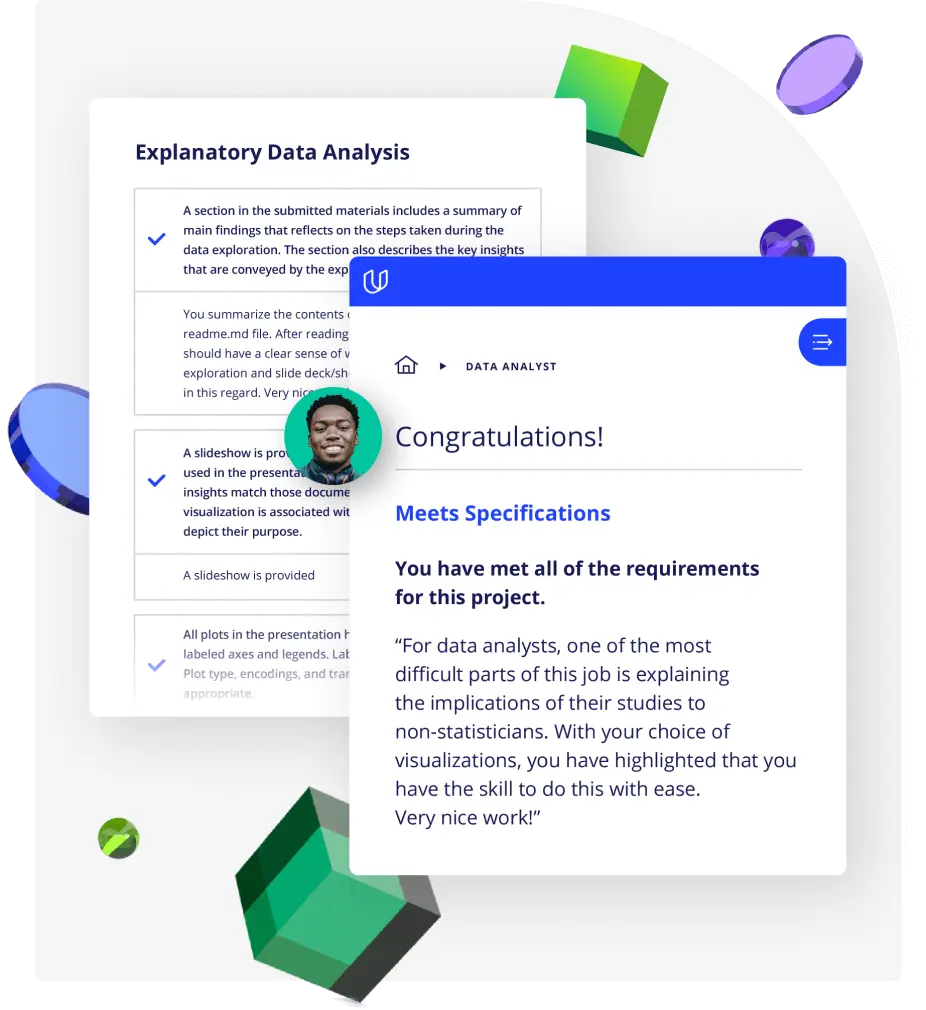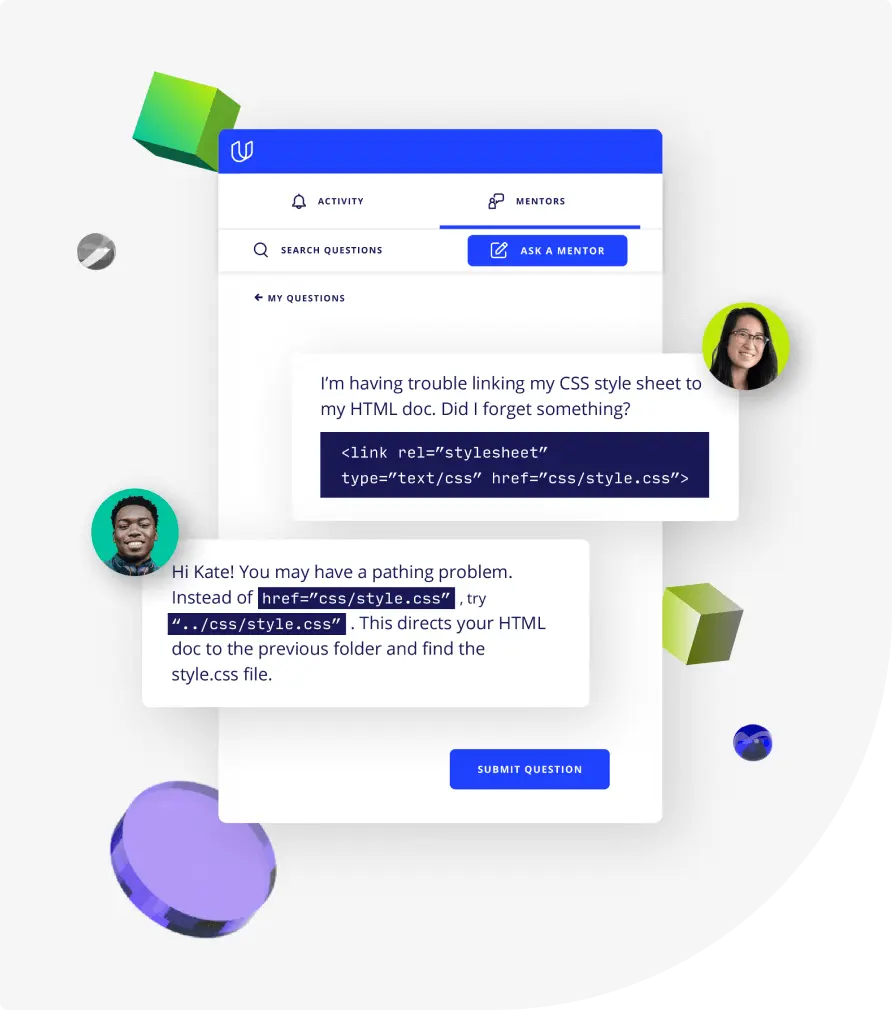Lesson 1
Welcome to Deep Reinforcement Learning
Welcome to the Deep Reinforcement Learning Nanodegree program!

Nanodegree Program
The Deep Reinforcement Learning Nanodegree has four courses: Introduction to Deep Reinforcement Learning, Value-Based Methods, Policy-Based Methods, and Multi-Agent RL. Students learn to implement classical solution methods, define Markov decision processes, policies, and value functions, and derive Bellman equations. They learn dynamic programming, Monte Carlo methods, temporal-difference methods, deep RL, and apply these techniques to solve real-world problems. They learn to train agents to navigate virtual worlds, generate optimal financial trading strategies, and apply RL to multiple interacting agents.
The Deep Reinforcement Learning Nanodegree has four courses: Introduction to Deep Reinforcement Learning, Value-Based Methods, Policy-Based Methods, and Multi-Agent RL. Students learn to implement classical solution methods, define Markov decision processes, policies, and value functions, and derive Bellman equations. They learn dynamic programming, Monte Carlo methods, temporal-difference methods, deep RL, and apply these techniques to solve real-world problems. They learn to train agents to navigate virtual worlds, generate optimal financial trading strategies, and apply RL to multiple interacting agents.
Advanced
2 months
Real-world Projects
Completion Certificate
Last Updated July 12, 2024
Skills you'll learn:
Prerequisites:
Course 1 • 1 day
Lesson 1
Welcome to the Deep Reinforcement Learning Nanodegree program!
Lesson 2
You are starting a challenging but rewarding journey! Take 5 minutes to read how to get help with projects and content.
Lesson 3
What to do if you have questions about your account or general questions about the program.
Lesson 4
Obtain helpful resources to accelerate your learning in this first part of the Nanodegree program.
Lesson 5
Reinforcement learning is a type of machine learning where the machine or software agent learns how to maximize its performance at a task.
Lesson 6
Learn how to mathematically formulate tasks as Markov Decision Processes.
Lesson 7
In reinforcement learning, agents learn to prioritize different decisions based on the rewards and punishments associated with different outcomes.
Lesson 8
Write your own implementation of Monte Carlo control to teach an agent to play Blackjack!
Lesson 9
Learn about how to apply temporal-difference methods such as SARSA, Q-Learning, and Expected SARSA to solve both episodic and continuing tasks.
Lesson 10
With reinforcement learning now in your toolbox, you're ready to explore a mini project using OpenAI Gym!
Lesson 11
Learn how to adapt traditional algorithms to work with continuous spaces.
Lesson 12
In the next parts of the Nanodegree program, you'll learn all about how to use neural networks as powerful function approximators in reinforcement learning.
Course 2 • 4 weeks
Apply deep learning architectures to reinforcement learning tasks. Train your own agent that navigates a virtual world from sensory data.
Lesson 1
This lesson covers the study plan and prerequisites for this course.
Lesson 2
Extend value-based reinforcement learning methods to complex problems using deep neural networks.
Lesson 3 • Project
Train an agent to navigate a large world and collect yellow bananas, while avoiding blue bananas.
Course 3 • 4 weeks
Lesson 1
Obtain helpful resources to accelerate your learning in the third part of the Nanodegree program.
Lesson 2
Policy-based methods try to directly optimize for the optimal policy.
Lesson 3
Policy gradient methods search for the optimal policy through gradient ascent.
Lesson 4
Learn what Proximal Policy Optimization (PPO) is and how it can improve policy gradients. Also learn how to implement the algorithm by training a computer to play the Atari Pong game.
Lesson 5
Miguel Morales explains how to combine value-based and policy-based methods, bringing together the best of both worlds, to solve challenging reinforcement learning problems.
Lesson 6
Learn how to apply deep reinforcement learning techniques for optimal execution of portfolio transactions.
Lesson 7 • Project
Train a double-jointed arm to reach target locations.
Course 4 • 3 weeks
Lesson 1
Obtain helpful resources to accelerate your learning in the fourth part of the Nanodegree program.
Lesson 2
Lesson 3
Lesson 4 • Project
Train a pair of agents to play tennis.

Content Developer
Mat is a former physicist, research neuroscientist, and data scientist. He did his PhD and Postdoctoral Fellowship at the University of California, Berkeley.

Content Developer
Miguel is a software engineer at Lockheed Martin. He earned a Masters in Computer Science at Georgia Tech and is an Instructional Associate for the Reinforcement Learning and Decision Making course. He's the author of Grokking Deep Reinforcement Learning.

Content Developer
Chhavi is a Computer Science graduate student at New York University, where she researches machine learning algorithms. She is also an electronics engineer and has worked on wireless systems.

Content Developer
Dana is an electrical engineer with a Masters in Computer Science from Georgia Tech. Her work experience includes software development for embedded systems in the Automotive Group at Motorola, where she was awarded a patent for an onboard operating system.

Curriculum Lead
Cezanne is an expert in computer vision with a Masters in Electrical Engineering from Stanford University. As a former researcher in genomics and biomedical imaging, she's applied computer vision and deep learning to medical diagnostic applications.

Curriculum Lead
Alexis is an applied mathematician with a Masters in Computer Science from Brown University and a Masters in Applied Mathematics from the University of Michigan. She was formerly a National Science Foundation Graduate Research Fellow.

Instructor
Arpan is a computer scientist with a PhD from North Carolina State University. He teaches at Georgia Tech (within the Masters in Computer Science program), and is a coauthor of the book Practical Graph Mining with R.

Instructor
Luis was formerly a Machine Learning Engineer at Google. He holds a PhD in mathematics from the University of Michigan, and a Postdoctoral Fellowship at the University of Quebec at Montreal.

Content Developer
Juan is a computational physicist with a Masters in Astronomy. He is finishing his PhD in Biophysics. He previously worked at NASA developing space instruments and writing software to analyze large amounts of scientific data using machine learning techniques.
Average Rating: 4.6 Stars
328 Reviews
Lucas Sabbatini de Barros F.
April 11, 2023
Even though the content is great, I enrolled in this program 5 years ago and it was the same content. They should’ve updated it and made the videos and lessons better.
Manjeet Singh N.
March 17, 2023
It covers the topic in sufficient detail and is not just a cursory introduction. Coding exercises and projects are pretty intensive.
Jairo M.
March 5, 2023
The program was much better than I expected.
Anthony Leonardo S.
November 18, 2022
It's Perfect
Greg N.
October 19, 2022
the jump between tuition and projects is quite large but it is hugely rewarding! I think RL is the only way to train agents
Combine technology training for employees with industry experts, mentors, and projects, for critical thinking that pushes innovation. Our proven upskilling system goes after success—relentlessly.

Demonstrate proficiency with practical projects
Projects are based on real-world scenarios and challenges, allowing you to apply the skills you learn to practical situations, while giving you real hands-on experience.
Gain proven experience
Retain knowledge longer
Apply new skills immediately

Top-tier services to ensure learner success
Reviewers provide timely and constructive feedback on your project submissions, highlighting areas of improvement and offering practical tips to enhance your work.
Get help from subject matter experts
Learn industry best practices
Gain valuable insights and improve your skills

Unlimited access to our top-rated courses
Real-world projects
Personalized project reviews
Program certificates
Proven career outcomes
Full Catalog Access
One subscription opens up this course and our entire catalog of projects and skills.
Average time to complete a Nanodegree program
(909)
4 months
, Intermediate
(450)
3 months
, Advanced
(275)
2 months
, Advanced
(496)
5 months
, Advanced
4 weeks
, Advanced
(256)
2 months
, Intermediate
1 month
, Intermediate
(235)
3 months
, Intermediate
4 months
, Intermediate
(363)
3 months
, Intermediate
4 weeks
, Intermediate
(87)
4 months
, Advanced
(81)
2 months
, Intermediate
4 weeks
, Intermediate
4 weeks
, Advanced
4 weeks
, Beginner

Deep Reinforcement Learning
(909)
4 months
, Intermediate
(450)
3 months
, Advanced
(275)
2 months
, Advanced
(496)
5 months
, Advanced
4 weeks
, Advanced
(256)
2 months
, Intermediate
1 month
, Intermediate
(235)
3 months
, Intermediate
4 months
, Intermediate
(363)
3 months
, Intermediate
4 weeks
, Intermediate
(87)
4 months
, Advanced
(81)
2 months
, Intermediate
4 weeks
, Intermediate
4 weeks
, Advanced
4 weeks
, Beginner